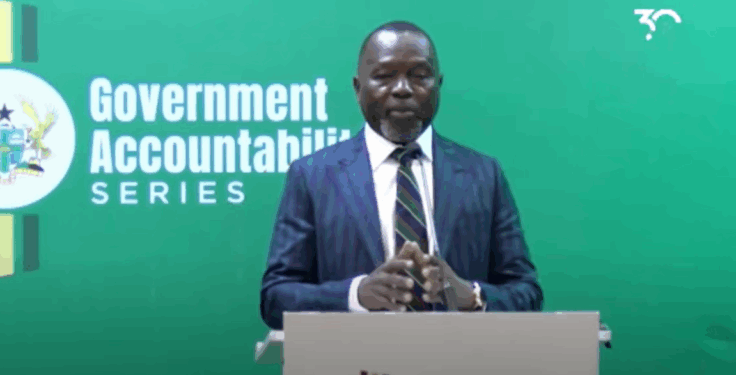Attorney General Justifies Dropping Duffuor Case, Says Recovery of Misappropriated Funds Preferable to Risking Total Loss in Court
Attorney-General and Minister for Justice, Dr Dominic Ayine, has defended his controversial decision to drop criminal charges against former Finance Minister Dr Kwabena Duffuor and seven others, citing pragmatic considerations around asset recovery over protracted and uncertain legal proceedings.
Speaking at the Government Accountability Forum on Monday, July 28, Dr Ayine stated that securing the recovery of 60% of the misappropriated funds represented a more economically rational outcome than risking full acquittal in a complex criminal trial.
“The records show the charges were contestable, and there was a high likelihood the defence could raise sufficient doubt to obtain an acquittal,” Dr Ayine noted. “If that happened, I could end up like in the Beige Capital case — unable to recover even a cedi.”
The Duffuor case stems from the collapse of uniBank Ghana, which the central bank resolved in 2018 amid allegations of regulatory breaches and insider dealings. The state had pursued criminal charges against the bank’s founder, Dr Duffuor, alongside other former executives.
Comparative Lessons from Beige Capital Case
In a rare disclosure, the Attorney-General revealed that in an earlier case involving Beige Capital, a GH¢10 million settlement offer was rejected in favour of criminal prosecution — a decision that, he said, ultimately yielded nothing for the state.
“I refused the offer. Today, I can’t recover 50 pesewas from Beige Capital,” he said, arguing that asset depreciation, legal delays, and the complexities of tracing illicit funds often render full prosecution economically inefficient.
Drawing on this experience, Dr Ayine maintained that opting for a negotiated settlement in the Duffuor matter was informed by the state’s need to prioritise timely recovery over uncertain judicial outcomes.
Public Backlash and Political Accusations
The Attorney-General’s decision has come under fire from anti-corruption advocates and the opposition New Patriotic Party (NPP), who claim the move undermines public trust and may set a precedent for elite impunity.
Critics have likened the arrangement to allowing a thief to keep part of their loot — a comparison Dr Ayine dismissed as overly simplistic.
“If a thief steals six goats and no action is taken, he may consume four before you intervene. In such a case, recovering four early is more prudent than waiting to retrieve two later — or nothing at all,” he said, arguing that asset values erode over time and delay reduces recovery prospects.
International Precedents and Legal Complexity
Dr Ayine also referenced the decades-long asset recovery effort following the Sani Abacha scandal in Nigeria, noting that even with international cooperation, only partial recovery has been achieved after nearly three decades.
“Recovery processes are inherently complex. If the Swiss, the UN, and successive Nigerian governments are still retrieving Abacha’s loot after all these years, then it is unrealistic to expect full recovery in every Ghanaian case,” he added.
Conclusion and Outlook
Dismissing claims of political bias in favour of Dr Duffuor — a senior figure in the ruling NDC — Dr Ayine insisted the decision was based strictly on legal merit and economic rationale.
“It is illusory to think the Attorney-General or the Republic can recover 100% in every case,” he stated. “The choice between recovery and prosecution is not always binary — it is strategic.”
The case has reopened debate over the balance between criminal justice and economic pragmatism in Ghana’s anti-corruption efforts, with implications for future enforcement strategy under the country’s ongoing financial sector clean-up.








